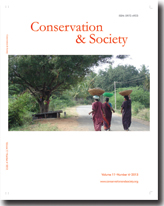
By Beatriz Rodríguez‐Labajos and Joan Martinez-Alier
Abstract
After 1992 many conservation biologists thought that the use of economic instruments would be more effective to halt biodiversity loss than policies based on setting apart some natural spaces outside the market. At the same time there was a new elaboration of the concept of ecosystem services and, since 1997, there have been attempts at costing in money terms the loss of ecosystem services and biodiversity, including the high profile TEEB (The Economics of Ecosystems and Biodiversity) project (2008-2011). Our discussion rests on instances showing the analytical implications of three main socio-economic meanings of biodiversity loss: 1) the loss of natural capital; 2) the loss of ecosystem functions; and 3) the loss of cultural values and human rights to livelihood. We review several approaches to include economic considerations in biodiversity conservation. We show cases where monetary valuation is relevant and other cases where it is controversial and even counterproductive, as it undermines the objectives of conservation.
How to cite
Rodríguez-Labajos, B., Martínez-Alier, J. (2013). The economics of ecosystems and biodiversity: Recent instances for debate. Conservation and Society, 11: 326–342.
Links: (free download)
http://www.

The project ENVJUSTICE has received funding from the European Research Council (ERC) under the European Union’s Horizon 2020 research and innovation programme (grant agreement No. 695446)